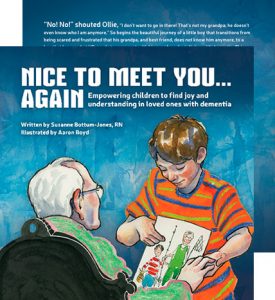Families making moments count this holiday season
Understanding the Person:
Changes in the brain commonly affect a person’s ability and level of coping with these areas:
Language:
creating words and following conversations with fast speech
Movement:
Brain is slow in telling the body what to do or perhaps the right order
Recognition:
Difficulty recognizing familiar items, what they are used for and words and their meanings.
Reasoning:
Difficulty with coping with changes or thinking through how to adapt, process or sequences of events. Emotions
Holidays are wonderful and we look forward to them but knowing what we just learned above let’s talk about what makes the holidays difficult for our family member with cognitive changes:
- Schedule changes: routines help us adapt
- Environment changes: locations and the way home looks
- Unfamiliar people: remembering names and faces
- Unfamiliar activities: Different tasks and communication
- Sensory overload: sounds, smells, physical touch
- Emotional overload: confusion and misunderstandings can lead to fear or feeling poorly about oneself, embarrassment
What can we do to set them up for successful interactions or conversations?
We can begin by:
Changing our mindset: Focus on remaining gifts vs. what they can’t do. Changing our expectations of them and the event
See through their lens: Asking ourselves: Is this a fair expectation of them today vs. in the past? Do they understand my request? Are they confused or fearful? Is this going to make them feel good about themselves or embarrass them?
Error on the side of too much support. I.e. Instead of saying “Dad you know who this is right?” whereby Dad feels foolish for not knowing their name, say, “Dad look whose here, your niece Brittany.”
Watch for signs of overload. We can watch for signs of anxiety or isolation and quietly remove our loved one from the stressor without calling attention to them.
Use positive communication strategies: approaching our loved one from the front, using eye contact, slowing down our pace of speech, using succinct short sentences, and allowing time for them to process information. Set up environment for them to be successful: one at a time conversations with a grandchild.
Show vs. tell mindset: Use pictures or demonstration of activities to assure that our loved one understands what we are asking them to do.
Smile frequently, Love abundantly, Enjoy the little moments

 “No! No!” shouted Ollie, “I don’t want to go in there! That’s not my grandpa; he doesn’t even know who I am anymore.” So begins the beautiful journey of a little boy that transitions from being scared and frustrated that his grandpa, and best friend, does not know him anymore, to a boy that learns what HE can do to reconnect with his grandpa who is living with dementia. This unforgettable story takes readers through a range of emotions, from sadness to hope, as Ollie learns how to better understand the effects of dementia experienced by his grandpa and what he can do to help hold on to his relationship and enjoy their time together. This story is a lesson for children and adults to learn to accept a loved one experiencing dementia and to celebrate the joy in the interactions they still experience together.
“No! No!” shouted Ollie, “I don’t want to go in there! That’s not my grandpa; he doesn’t even know who I am anymore.” So begins the beautiful journey of a little boy that transitions from being scared and frustrated that his grandpa, and best friend, does not know him anymore, to a boy that learns what HE can do to reconnect with his grandpa who is living with dementia. This unforgettable story takes readers through a range of emotions, from sadness to hope, as Ollie learns how to better understand the effects of dementia experienced by his grandpa and what he can do to help hold on to his relationship and enjoy their time together. This story is a lesson for children and adults to learn to accept a loved one experiencing dementia and to celebrate the joy in the interactions they still experience together.